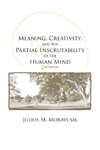

|
|
|
|

Meaning, Creativity, and the Partial Inscrutability of the Human Mind, 2nd EditionThis book criticizes current philosophy of language as having altered its focus without adjusting the needed conceptual tools. After the critique, a new conception is presented with new semantic tools. The first edition presented the part of the theory which introduced for formal predicates partial explanatory structures, filled in varieties of ways by context. It also presented the human mind as seeking primarily explanation and understanding, with information processing taking a second conceptual place. In the second edition, a new theory is presented that replaces the formal semanticist's singular reference with the notion of identication that singles out elements for linguistic communities so that descriptive terms can be attached to the identification without existential import. Identification in our sense brings with it also leaving as much implicit in a communication as possible. Thus identifications are contextualized. Given the indeniteness of the contexts, an identificational use can be expanded to cover identifications in new uses. (1931–2009) was Professor of Philosophy at Stanford University. Praise for the First Edition of Meaning, Creativity and the Partial Inscrutability of the Human Mind“[Moravcsik's] new book extends his earlier ideas in new directions, offering real insight into classical problems of conceptual analysis and natural language semantics. His work is not only refreshingly original, but also informed by a deep understanding of sources from classical Greek philosophy to the present.” –Noam Chomsky Contents
September 26, 2016 ISBN (Paperback): 9781575864808 (1575864800)
|
Distributed by the
University of Chicago Press |
|
pubs @ csli.stanford.edu
|
CSLI Publications
Stanford University Cordura Hall 210 Panama Street Stanford, CA 94305-4101 (650) 723-1839 |